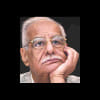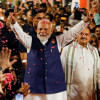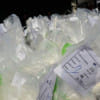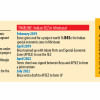Money makes the mare go
That some Indians have stashed money abroad was known even when I began my journalism career almost 60 years ago. The West German government once provided us with a list of depositors from India, but nothing came out of it because the people involved enjoyed political patronage. The much-hidden Swiss accounts were also given to the government when it made an official request. No action followed since it was once again seen that the people who had kept their money were influential.
I recall the Union Home Ministry once making an inquiry into the foreign funding of political parties after a furore in Parliament. The report was never revealed, but it was revealed unofficially that all political parties, including the Left, had their accounts in West Germany or Switzerland.
The revelations made now about the offshore investments by Indian businessmen and industrialists are in the same category. One must congratulate the intrepid journalists for this. After talking to the journalists, I found that it had taken more than six months to collect information about the money deposited here and there, and collate it.
Understandably, Prime Minister Narendra Modi has set up a panel of officials from the income-tax department, the Reserve Bank of India (RBI) and Enforcement Directorate to probe the matter and apportion responsibility. Yet, nothing concrete would come out of it because the persons connected with the dealings have political clout.
The Parliament may take up the matter, since the entire nation is horrified over the disclosures. Yet again, the matter would not go beyond accusations and counter-accusations, since all political parties are involved in some way or the other. Parties have to oil their setups, and they have to have some sources to do so.
The bane of the problem is the money needed during elections. Election cost to assembly constituencies is estimated at Rs. 10,000 crore. Naturally, the Lok Sabha elections would need several more crores of rupees. Even individual voters are being paid in cash or kind by different political parties to woo them. For example, Tamil Nadu, which is going to the polls next month, has already had the maximum number of arrests connected with pre-poll unaccounted money.
Many parliamentary committees have gone into the funding with the purpose of reducing the expenditure. Instead, the expenses have gone up. The Election Commission has banned publicity and several ills which were spotted during the electioneering process. But the overall situation has worsened, not improved. In fact, every political party, particularly the ruling ones, use all kinds of methods to win elections.
Power has come to mean not only authority but also money for the cadres. Therefore, no method is 'mean' enough to win. The manner in which caste is exploited, makes a mockery of free balloting. The Constitution debars all these practices, and yet parties use castes and sub-castes because this, apart from money, influences voters the most.
Finance Minister Arun Jaitely's statement that there are "no holy cows for them: is all right as it goes. Yet, he knows that those who finance political parties cannot be touched because they are the ones which sustain them. How can a political party cut the hand that feeds it?
The Election Commission in its various reports has complained that a candidate spends more than the limit laid down. According to the limits defined, an assembly candidate should not spend more than Rs 28 lakh while the Lok Sabha's limit is up to Rs. 70 lakh per constituency. However, candidates spend many times more. Since there is no limit placed on the expenditure by political parties, the Election Commission is helpless in taking action when it finds that a candidate for assembly or the Lok Sabha does not stay within the limit.
The accounts which the legislatures submit to the Election Commission are all cooked up because they find it not possible to adhere to the rules if they have to cover the constituencies. Several vehicles and volunteers are required to reach every part of the constituency and yet the candidates find it difficult to cover all of them. The television medium has made things easier. But a candidate does not want his message go out as an advertisement. One, it costs a lot of money, and two, the viewers do not like canvassing through advertisements.
If the Prime Minister can live with statements of bogus election expenses, he can very well accept the offshore investments which are unethical but not illegal. After all, this is their way of avoiding paying high taxes in India. High taxation in the county is again the reason why businessmen and others prefer to keep their money abroad. The government has declared amnesty many a time and made it attractive for businessmen and industrialists to disclose their assets abroad. But how to make them keep money at home and pay taxes is the problem.
I recall that India was facing acute foreign exchange crisis when I was the High Commissioner at London in 1990. I made a personal appeal to the people of Indian origin living there that the country which they called Bharat Mata required their contribution urgently. But my request fell on deaf ears. They were looking for good returns. Once they were offered bonds which would ensure high returns in foreign exchange, they were very willing to invest. For them, the love of the country had to be translated into money.
By all means, the Prime Minister should probe offshore investments. And he is justified in doing so. But he should realise that the investors who found tax havens abroad will find some other ways to evade taxes. In fact, a probe is needed to find why Indians prefer money to the interests of their motherland? For this, mere slogans like Bharat Mata Ki Jai will not help. The RSS which has coined the slogan should find ways to evoke that kind of love. But how can it do so when it doesn't believe in a pluralistic society, the ethos of India?
The writer is an eminent Indian columnist.

 For all latest news, follow The Daily Star's Google News channel.
For all latest news, follow The Daily Star's Google News channel. 








Comments